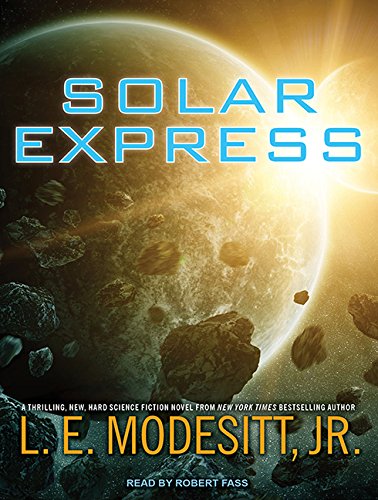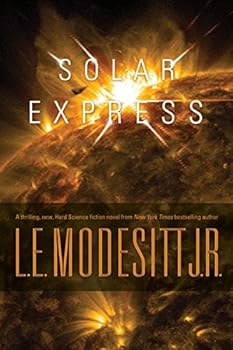
![]() Solar Express by L.E. Modesitt Jr
Solar Express by L.E. Modesitt Jr
L.E. Modesitt Jr’s newest work is a stand-alone hard science fiction novel that takes place in the 2100’s when the geo-political landscape of Earth has changed dramatically. Climate change and bad economic policies have nearly destroyed the United States, which now belongs to the North American Union. The major world powers have been exploring space, but all have signed a treaty that prevents them from weaponizing their spaceships or militarizing space in other ways. War threatens, however, after the Sinese Federation accuses the North American Union and the Indians of breaking the treaty. The Sinese seem to be using their alleged suspicions as an excuse to build up their own military capabilities in space.
As tensions rise, Alayna Wong-Grant, a young astrophysicist with a grunt job on a lunar space station, notices an anomaly in her data which indicates that an unknown object is travelling through the solar system on a direct course toward the sun. After much testing, she and her superiors decide that the object is not a comet, as previously thought, and could possibly be an alien artifact. The government decides to send Chris Tavoian, a young pilot who Alayna recently met, to the artifact. Chris will control robotic rovers that will explore the object and collect data. Chris is excited about the possibility of being the first human to see an alien spaceship, but he’s upset that he will not be able to be home with his dying mother.
 With its female post-doc protagonist, settings on a lunar research base and a spaceship, explorations of alien artifacts, and theorizing about the space-time continuum, Solar Express is the type of novel that I normally would enjoy. Unfortunately, I was bored almost the entire time I was reading Solar Express. I really hate to say this, but I don’t think Modesitt got any of the aspects of this novel right — characters, plot, pace, or writing style.
With its female post-doc protagonist, settings on a lunar research base and a spaceship, explorations of alien artifacts, and theorizing about the space-time continuum, Solar Express is the type of novel that I normally would enjoy. Unfortunately, I was bored almost the entire time I was reading Solar Express. I really hate to say this, but I don’t think Modesitt got any of the aspects of this novel right — characters, plot, pace, or writing style.
The two point-of-view characters, despite being very different people (Alayna is a female astrophysicist, Chris is a male spaceship pilot) are nearly indistinguishable in tone. Both sound the same and both even talk to themselves in the second person. We learn a little about each character’s family and backstory, but though there is a developing email romance between them, we learn almost nothing about their personalities and preferences. These people feel like props and they hardly engaged my sympathies.
The plot is, frankly, boring. Most of the story alternates between the lunar station where Alayna is working and the spaceship where Chris is studying the artifact. While on the lunar station, we watch Alayna make repairs, collect data, do some math, read the news, and read and write emails to her family and to Chris. When Chris is in his spaceship, we watch him eat, exercise, program robots to explore the artifact, take measurements and collect other data from the artifact (Chris never visits it himself, it’s explored remotely), read the news, and read and write emails to his family and to Alayna. That’s pretty much it. It’s slow, repetitive (they do and say the same things over and over), and dull. Also, while we’re talking about plot, there were a couple of things that didn’t make sense to me. For example, why was Chris sent to the artifact instead of a scientist who would know how to do the kind of research that needed to be done? Communication wasn’t a problem, so why wasn’t Chris at least talking to scientists who could make suggestions about what he should do next?
Similarly, the writing style is unengaging. It mostly alternates between the two POVS which are written in third person with second person interruptions that I found irritating after a while:
Alayna stopped reading. You’ve only been here a little over a month and you’re going to have to host a government inspection team? She forced herself to keep reading.
For some variety, there are occasional interludes containing various news flashes from a Drudge Report style news aggregator. These news items (which sound strangely old-fashioned to me) are often about the developing political situation in which the three superpowers are starting to distrust each other’s intentions in space. I didn’t find the news, or the political tensions, to be very interesting, though Modesitt uses his fictional set-up to make commentary about our current political, military, and economic systems. This is usually in the form of quotes that Chris and Alayna read in books and send to each other.
In the end, I didn’t understand the point of Solar Express. I appreciated that Modesitt speculated about the consequences of climate change, that his female scientist ended up contributing to the general theory of relativity, and that he emphasized that even when major world-changing events are going on it’s the little personal life stressors that really matter to us. I just wish the story could have entertained me at the same time. Instead it was dry and clinical.
I listened to Tantor Audio’s edition of Solar Express. It’s 17 hours long and was read by Robert Fass. This was a nice production. Too bad I can’t recommend this book.



That’s a shame because this sounds like a great idea. I guess I’ll just reread RENDEZVOUS WITH RAMA again instead.